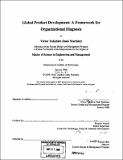Global product development : a framework for organizational diagnosis
Author(s)
Martínez, Víctor Takahiro Endo
DownloadFull printable version (8.655Mb)
Other Contributors
System Design and Management Program.
Advisor
Ricardo Valerdi.
Terms of use
Metadata
Show full item recordAbstract
The main purpose of this thesis is to present an approach for analyzing product development organizations in a globalizing world. The fragmentation and distribution of several product development activities in the global market have generated a variety of strategies. In addition, an increasing visibility of the influence of cultural diversity in these strategies and an intensified sensitivity to sustainability issues motivate this research. Retaking the questions of which is the best strategy for product development organizations to succeed and, even further, which is the measure of success for these organizations are also part of the motivation behind the research. The methodology followed for constructing the socio-technical framework presented in this document mainly consisted of gathering, analyzing, and integrating existing literature and frameworks from systems engineering, social, and management studies. Utilizing a macro-framework with three spectra -space, time, and context- the framework allows the decomposition of the product development system into three levels, identifying the key stakeholders and roles within the system. The framework includes four different angles -structural, human resources, political, and symbolic- from which a product development organization can be diagnosed. Also, the knowledge of predictable reflexive human responses is presented as a means for stabilizing an organization. In parallel, the study includes an exploratory approach for finding a robust way of measuring a product development organization. Finally, an intervention strategy is proposed as an outcome of both the research process and the framework presented. An automotive product development organization was selected for testing the applicability of the framework.
Description
Thesis (S.M.)--Massachusetts Institute of Technology, System Design and Management Program, 2008. Includes bibliographical references (leaves 125-128).
Date issued
2008Department
System Design and Management Program.Publisher
Massachusetts Institute of Technology
Keywords
System Design and Management Program.